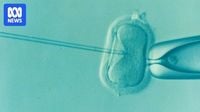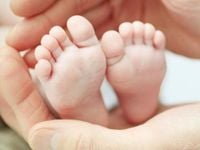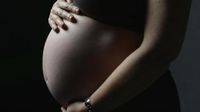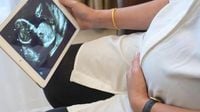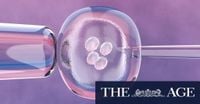A woman has unknowingly given birth to a stranger's baby following a shocking mix-up at Monash IVF, a prominent fertility clinic in Brisbane. This incident, which is reportedly the first of its kind in Australia, has raised serious concerns about the safety protocols in assisted reproductive technology.
The mix-up was discovered in February 2025, when the birth parents requested to transfer their remaining frozen embryos to another IVF provider. During this process, clinic staff found an additional embryo that was not accounted for. After further investigation, it was confirmed that the mother had been implanted with an embryo from another patient, resulting in the birth of a child that was not hers.
"Instead of finding the expected number of embryos, an additional embryo remained in storage for the birth parents," a spokesperson for Monash IVF stated. The revelation has left both families involved feeling enraged and distraught, as they grapple with the emotional fallout of such a profound error.
Michael Knaap, CEO of Monash IVF, expressed deep regret over the incident, stating, "On behalf of Monash IVF, I want to say how truly sorry I am for what has happened. All of us at Monash IVF are devastated and we apologise to everyone involved. We will continue to support the patients through this extremely distressing time." Knaap emphasized that the clinic is committed to providing support to both families affected by the error.
The company has acknowledged that the incident was caused by human error and has initiated an independent investigation to determine the specifics of how the mix-up occurred. This investigation will be led by senior counsel Fiona McLeod, who will examine the circumstances surrounding the embryo transfer and recommend measures to prevent future occurrences.
In addition to the internal investigation, Monash IVF has reported the incident to relevant assisted reproductive technology regulators, including the Reproductive Technology Accreditation Committee and the newly established Queensland ART regulator. This disclosure is part of their commitment to transparency and accountability in the wake of the incident.
Monash IVF has assured the public that it adheres to strict laboratory safety measures designed to protect the embryos in its care. Knaap noted, "Since becoming aware of this incident, we have undertaken additional audits and we’re confident that this is an isolated incident. We are reinforcing all our safeguards across our clinics." The clinic has emphasized its dedication to ensuring the safety and well-being of its patients.
This incident comes less than a year after Monash IVF faced a class action lawsuit that resulted in a staggering $56 million payout for negligence. The lawsuit involved more than 700 patients who claimed that the clinic had used inaccurate genetic testing, leading to the destruction of potentially viable embryos. Although Monash IVF settled the case without admitting liability, the fallout from that incident has undoubtedly heightened scrutiny of the clinic's practices.
Founded in Melbourne in 1971, Monash IVF has a long history in the field of reproductive technology, claiming to have assisted in the birth of over 50,000 babies since its inception. The organization achieved the world’s first IVF pregnancy in 1973 and Australia’s first IVF birth in 1980, establishing itself as a leader in fertility treatment.
The recent mix-up has sparked discussions about the importance of rigorous protocols in fertility clinics. Experts in the field have stressed that while human error is an unfortunate reality, clinics must take every possible step to minimize risks associated with embryo handling and transfer.
Queensland Health has also been informed of the incident, with a spokeswoman stating, "We will work with Monash IVF to reinforce safeguards in their Queensland clinics and ensure any risks are identified and mitigated." The ART Act, passed on September 10, 2024, was a response to previous complaints regarding the collection, storage, identification, and distribution of gametes and embryos, highlighting ongoing concerns within the sector.
As the investigation unfolds, both families involved in this harrowing incident will likely seek legal recourse against Monash IVF. Legal experts suggest that the emotional and psychological impact of such a mix-up could lead to significant claims for damages, especially given the profound implications of raising a child that is not biologically related.
The broader implications of this incident may also prompt regulatory bodies to reassess the standards and practices of fertility clinics across Australia, ensuring that patient safety remains the top priority. As public interest in reproductive technologies continues to grow, the spotlight on clinics like Monash IVF will only intensify.
In the meantime, Monash IVF is working to regain the trust of its patients and the wider community. The organization has committed to implementing all recommendations from the independent investigation, aiming to bolster confidence in its services and ensure that such an incident does not occur again in the future.
